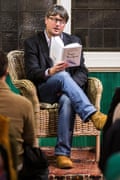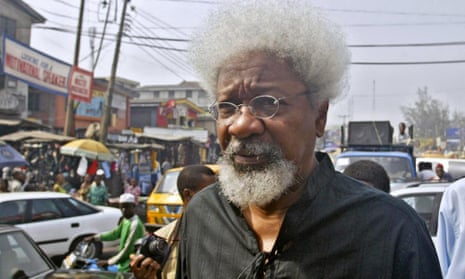It’s wonderful that the Guardian continues to devote ink (and gigabytes) to the election of the Oxford professor of poetry (Report, 26 May), but you seem to have already decided it is a two-man race – man being the operative term – between Wole Soyinka and Simon Armitage. You have almost entirely ignored the only woman running, the fine poet, classicist and translator AE Stallings, who has also been a recipient of a MacArthur “genius” award. Not only has she the support of intellectual stalwarts such as Mary Beard and Christopher Ricks (a former holder of the post), as well as an endorsement from the Times Literary Supplement, but she had the second highest number of nominators after Soyinka. Yet in the Guardian she has been relegated to the status of “also running”, if she is mentioned at all.

Forty-four men have held the post during the more than 300 years it has existed. Trying to break into this enclave of the poetry establishment is hard enough without being discounted from the starting gate by a paper one would have thought would be sympathetic.
Nicole Itano
London
The thumbnail sketches of three of the candidates in the election for Oxford’s professor of poetry (The week in books, Review, 30 May) manages in the case of Wole Soyinka not once to mention that the 1986 Nobel laureate is a poet, author of eight collections, nine if his Selected Poems are counted in. Recently the 17 stanzas of his poem Migrant have been carved into 17 headstones, one per headstone, and placed (March 2015) in the monument in the Sicilian town of Etna built to the memory of all migrants who have perished and will perish at sea. It commemorates two girls, two women, and 13 men, Syrians and Nigerians, among 300 who drowned off the coast of Lampedusa in May 2013, the first of many nameless, but remembered always in Soyinka’s timely and timeless words.
Soyinka would have been an exceptional candidate in any of the Oxford poetry elections since 1966 (the Robert Lowell-Edmund Blunden contest) and remains a poet who acts and writes with unwavering courage and humanity. All Oxonians, town as well as gown, and many, many more people beyond Oxford, would benefit immeasurably from his dynamic and generative presence (“a restless bolt of energy”) as successor to Geoffrey Hill.
Bruce Ross-Smith
Oxford
Melvyn Bragg’s letter (29 May) clarifying his grounds for supporting Simon Armitage for the post of professor of poetry appeared in the same edition as news of the nomination of Louise Richardson as Oxford’s first female vice-chancellor. Professor Richardson has declared her wish to see Oxford become more socially inclusive (Report, 29 May). The university could signal its recognition of the importance of inclusiveness by a vote for Armitage. Unmistakably northern, he writes poems that are accessible to all, regardless of age, region and class. If poetry is to widen its appeal, it needs to broaden its accent and extend its social reach. So does the University of Oxford.
Professor Glyn Turton
Shipley, West Yorkshire
